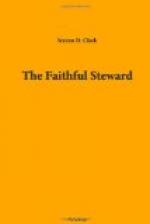Not long since, thousands were starving and dying in Ireland. A cry of anguish came up, and thousands of generous American hearts responded to the call. This was noble. It was thought to be an especial occasion for benevolence. Who did not feel that every Irish landholder should have shared his abundance with the suffering and dying poor around him? But what is the death of the body to the death of the soul! What is the temporal destruction of a few thousands to the eternal damnation of hundreds of millions! Was it the duty of the wealthy Irish to feed their starving neighbors? And since the providence of God has made the remotest of earth’s dwellers who are perishing for lack of vision our neighbors, should we not supply them with the bread of heaven, and thus prevent untold agonies? I ask every candid reader, is not the present a special occasion for benevolence? and if the church is to be the instrument by which God has determined to work in restoring the kingdoms to his Son, will it not be such an occasion till that blessed period arrives, when there shall be nothing to hurt or destroy in all God’s holy mountain?
15. The duties growing out of the possession of property in view of death, judgment, and eternity. The obligations imposed upon us by the possession of wealth may be irksome, but we cannot escape them; we must bear them to the judgment. In our pride we may resolve that we will use our money as we please; but God commands us to use it as he pleases. A vivid sense, then, of the tremendous scenes before us should be ever associated in our minds with ideas of property. We should realize how our wealth will appear in the final hour, as its pleasures and enchanting illusions begin to fade from the dying eye, and as we reflect how short and unsatisfactory, like “a dream when one awaketh,” all these enjoyments have been. Rioting amid the luxuries of affluence, and giddy with its bewildering joys, these may be unpleasant thoughts. But why regard thoughts of that which we cannot avoid, unpleasant? We must not only think of these dread realities, we must meet them, and experience all their joy or woe. Then let us realize, now and always, how all our uses of property will appear at the bar of God, where the thought of every misimprovement will be sharper than a serpent’s fang; how, in eternity, as we contemplate those who might have been saved by our liberality in undying misery; how, if we are lifting up our eyes with them in torments; how, if, while we ourselves shall be saved as by fire, we behold them excluded from those blissful seats by our covetousness. Let each one put these searching questions to his own conscience; and let him take heed that his gifts be such, that their remembrance will not only sweeten his dying moments, but diffuse a fragrance over all his future being.




